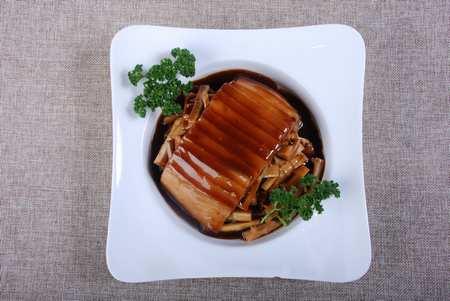 |
| Meat-free fare. (Photo: Global Times) |
BEIJING, May 22 -- As more people become vegetarians, the world is on its way to a diet revolution. According to a 2006 survey by Mintel, a British market research firm, nearly 6 percent of the population, or 3.6 million people in Britain are vegetarians, and 10 percent eat no red meat. The number of adult vegetarians in the United States is 3.2 percent of the population or 7.3 million people, according to a 2008 study called "Vegetarianism in America" published by the Vegetarian Times.
It's widely claimed that becoming a vegetarian can have significant health benefits. According to the website of The Vegetarian Society of the United Kingdom, a vegetarian lifestyle can be considered good for your health "because it matches the kind of low fat, high fibre diet recommended by dieticians and doctors." Other reasons for choosing a vegetarian lifestyle include the relatively lower cost of eating vegetarian, religious beliefs or a dislike of modern farming practices for ethical or environmental reasons.
And while critics of the vegetarian lifestyle continue to question the nutritional content of a vegetable-only diet, health authorities do not believe that it can lead to malnutrition. The United States' National Institutes of Health writes on its "Medline Plus" website, "People who follow vegetar-ian diets can get all the nutrients they need. However, they must be careful to eat a wide variety of foods to meet their nutritional needs. Vegetarians may need to focus on including protein, iron, calcium, zinc and vitamin B12."
"Fake Meat"
Whatever reasons an aspiring vegetarian might have for going veggie, the process of weaning off meat can be a hard one. One approach is to eat vegetables which have been processed to taste and look like meat.
Lu, a sophomore from Fudan University, told the Global Times, "I found I couldn't keep myself from eating meat. But I didn't want any more animals to be killed just because I was hungry. I thought every piece of meat I ate was murder, and I was the murderer. It was quite a contradiction. When a friend of mine informed me about this kind of vegetarian diet, I was more than happy. This time I am sure I can abandon eating meat once and for all."
However, some vegetarians might question this approach. Traditionally, vegetarians have eaten dishes that don't include 'fake meat' substitutes in their vegetarian lifestyles, enjoying and adapting to the taste of vegetables as they are. Nevertheless, "fake meat" is in vogue, and more and more young people are apt to make the transition to life without meat, with or without the "fake" kind.
When asked about "fake meat" dishes, Zeng Fangying, vice-president of the local vegetarian food chain Jujube Tree, told the Global Times, "These dishes have held great sway with meat eaters. They help clarify and dispel the mysteries and misunderstandings of vegetarian food as they are made from green vegetables and tofu. It's easy to enjoy vegetables the same way as eating meat."
When asked about the rising trend of eating "fake meat," Zeng answered, "It's an interesting phenomenon. Businessmen in formal suits book dinner and negotiate deals in our restaurant. And young people emulate them in much the same way. They think it is 'cool' to treat friends or to celebrate special occasions in a vegetarian restaurant."
Regardless of what your views are on vegetarianism or "fake meat," more people are trying and converting to this lifestyle. Sooner or later you'll probably end up eating your favorite meat dishes made with "fake meat."
(Source: Global Times)
Related News
Photos
More>>trade
market
- Chinese Premier urges efforts for quick summer grain harvest
- Symposium on Agricultural Cooperation Between China and Baltic States Held in
- Vice Minister Niu Dun Meets with Chairman and CEO of Kverneland Group
- China's May exports up 48.5%
- Vice Minister Niu Dun Meets with Brazilian Minister of Fisheries and Aquaculture
finance
- Chinese cherry hits the market
- Vice Minister Niu Dun Meets with Ukrainian Ambassador to China
- 2010 Forum of Chinese Fishery Economists Held in Beijing
- International Conference on Chinese Caterpillar Fungus Held in Qinghai
- Integration-the Fundamental Measure to Promote Sound and Steady Development of





